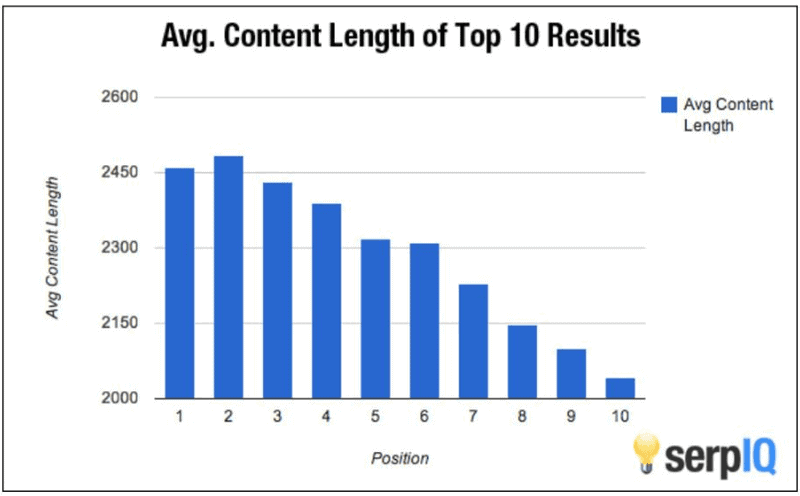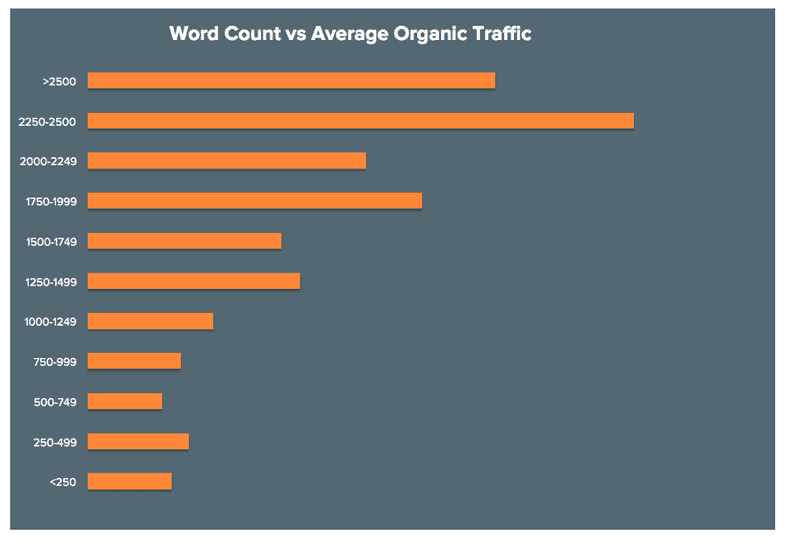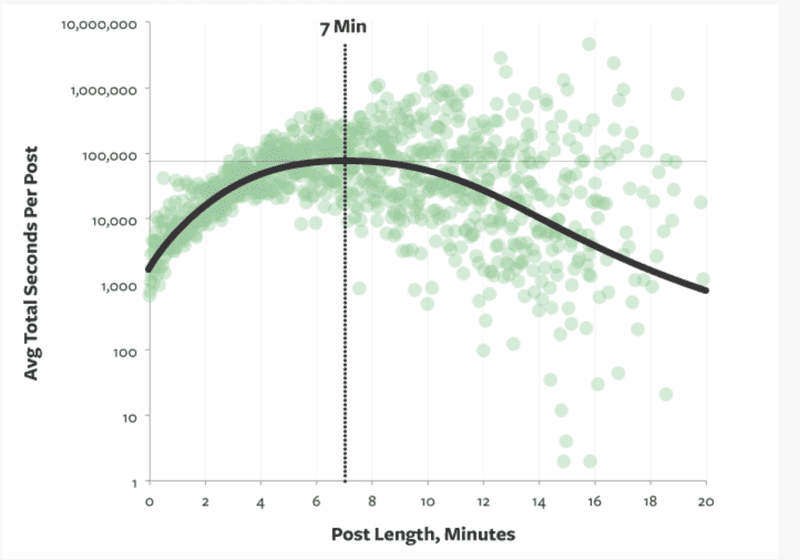Here’s the thing: human attention spans are incredibly short, or so they say. Some studies say that it is shorter than a goldfish’s and that is not a good thing, at all.
However, if you consult someone for digital marketing purposes, they’ll have you believe that long-form content is what is best. The long posts that take a good chunk of time to get through, those ones. The word count for long-form content goes beyond 1,200 words, at the very least and it is these type of content that are supposed to be key to get the best results.
It might seem that our short attention spans are in conflict with what the ‘experts’ say are the perfect word count. Which leads us to actually ask the question “how long should a blog post be?”
In this blog post (that once completed should come to about 2,000 words), we will try to find the answer to that question.
Table of Contents
We’ve established that long-form content is what seems to be working in the current era. It doesn’t necessarily mean that the days of short-form content are gone, but there is a clear preference towards content that is on the longer side of things.
What, then, is the exact number that you need for your blog posts to hit that perfect spot?
It’s... complicated.
While it certainly is easy for us to say “long-form content works best”, we can’t come up with the perfect magical number. Fortunately for us, we don’t have to. Below, we’ll look at some of the answers given to us by the industry experts.
The SEO-focused company Moz coordinated with content-promotion company BuzzSumo to do some in-depth analysis on over a million articles to get an insight as to how the content of a post, the links it has and it’s shares are all intertwined. Their research concluded that:
While the results of Moz and BuzzSumo’s seem to state somewhere between 1000 and 2000 as the perfect length for your blog posts, there are more studies conducted on the same subject matter.
The keyword research tool SerpIQ conducted a study on the matter in 2012. They used over 20,000 keywords to find the average content lengths for the top 10 results for each keywords.
Their results are shown below:

I think the image says more than we could put in words. To hold one of the top ten spots in Google’s search engine, you need at least a minimum of 2,000 words. The average word count for all the content in the number one spots was around 2,400 words.
It goes without saying that Google is the number one search engine in the world. So, if we are take the concrete results they provide as a guide, the optimum length for your blog post is above 2,000, somewhere around 2,400.
Backlinko, a company dedicated to link-building and SEO, also conducted some research on optimum word lengths. They looked into factors that affect search engine rankings by using about a million search results from Google.
Backlinko found that content that makes it to the much vaunted front page of Google’s search engine averages around 1,900 words.
Since three studies that are providing distinctly different numbers aren’t enough to confuse you, here’s another study on optimum word count for blog posts. This one is from Hubspot. Their study into the The Anatomy of a Shareable, Linkable & Popular Post gave an answer that was in line with Google’s – 2,250 words, or greater.

However, there is a noticeable decline one you’ve exceeded the 2,500-word count.
There is one small thing to consider, though. Hubspot’s study also found that content over 2,500 words, while showing a decline in search engine rankings, were consistently being shared more often on social media platforms and had more backlinks. So, if your goal for your content is to get more shares on social media, aim for more than 2,500 words.
You’ve seen all the numbers and they are… varied, to say the least. The only constant seems to be that they need to be above a 1,000 words. Then, is there a secret to having the perfect blog post length?
Yes.
Kind of.
The secret to the perfect blog post length… depends on your goals. While all your content should be, without fail, of high quality – quality is always king – the length will depend on what your specific goals are.
Here, let’s take a look at two major goals you can have for your company and how they play a role in the length of the content you publish:
Let’s break it down.
To figure out what the optimum length for a search engine optimized blog post is, you need to consider the current trends in search engines.
Much like anything else in the world, search engines are always evolving and different factors come into play at different times. So, the perfect blog post length of 2010 won’t apply for 2020. That’s just the way it is.
Google, the uncontested leader in search engines, debuted a mobile-first index in the past year. Which means that content that is not optimized for mobile devices will not achieve high ranks, even if they are spot on with every other factor. The world is increasingly becoming mobile, so it is understandable that optimizing your content for mobile devices is very important.
However, research shows that the perfect length falls at around 7-minutes. To read, that is.

However, the truth is that we still can’t rely on that as the god-given perfect length for success in SEO for your website or blog.
Because it is not just about length.
Sure, length is a key factor. However, you also need to provide quality content. You need to outdo your competitors by producing content that is better, in every avenue.
At RankToday, we have a motto:
Quality is always king.
The truth is, word count is ultimately keyword-dependent. The specific keyword you’re targeting will ultimately provide you with an approximate length for your content. Some keywords will rank better when it’s 500 words, some keywords will rank better at 2,500 words.
However, quality will always strengthen your position.
Of course, if you can provide a high-quality 1,000 word post for a keyword that currently ranks just 600 word posts… You will have a surefire shot and taking your place at the top. People will invest in your brand because you provide quality above quantity, so… if you can provide quality and quantity? The results will be nothing but good.
We’ve looked at content length (and quality) that will net you the best rankings in search engines. However, it won’t be the same number when your goal is to increase brand awareness.
Let’s get some basics out of the way first.
Brand awareness is the extent to which your audience recognizes your brand. Subsequently, it is also the extent to which your audience connects with your brand. It is the first thought that pops in their head when they see your brand’s name or it’s logo.
If your goal is to create brand awareness, you should ideally– No, not just ideally. You should be aiming to create a positive association for your brand.
When your goal is to create and/or increase brand awareness… you can worry less about the ideal blog post length.
This is because the point of the content you create for brand awareness is to… create brand awareness. And you do that by pretty much shouting as loud as you can. Well, it’s the internet. You don’t necessarily shout. You… The point is that you are trying to get attention.
There are a number of ways to accomplish this, including repurposing your popular posts or long-form content into a more visual medium like snappy infographics or a quick digest form like a cheat sheet or a checklist.
Other ways to create brand awareness include:
One of the best ways to get your point across to your audience is to use interactive content, like video. It will help your audience understand your brand better.
People simply prefer videos over text. While it is an unfortunate fact, it is also something you can take advantage of.
By creating a solid script that will relay all the necessary points you need to get across, combining it with striking visuals and producing a good video, you can create all the brand awareness you need within a minute, or two at most.
The relevance and popularity of social media are at an all time high. To create brand awareness for your company, you can take advantage of it. As an added plus, it comes with increasing engagement with your audience.
Many brands have mastered the art of using the limited functionalities that social media has to maximize their contents’ effectiveness. Despite the limited characters of Twitter or the image-only nature of Instagram, you stand to gain a lot by effectively using social media for your short-form content.
These are the text posts. While the open access nature of the internet has given rise to a flood of shallow, low-quality short content, it doesn’t completely mean that short-form posts are to be set aside.
By combining a mixture of good persona and providing real value to your audience, you too can create brand awareness by using short-form content.
Look at the statistics for IFLScience:

IFLScience’s content is nearly almost entirely made up of short-form content. A vast majority of their posts are under 1,000 words. And yet, you can see their success reflected in the numbers. How does this happen?
IFLScience is hooking in the attention of their audience and providing a reason for them to click on their content by:
You might be unsurprised to find out that end the end of the day, these factors all still add up to providing excellent content.
Well, there is none.
That is the long and short of the whole topic. There is no definite answer that we can give you about the ideal length for blog posts.
It depends on a number of factors. Search engines seem to have a preference for long-form content, so if you want to strengthen your brand and climb up the ranks of the search engines… focus on creating content that is over 1,000 words. Preferably content that tops 2,000 words.
If your aim is to promote your brand and create brand awareness, you might be better off using other methods. Repurpose long-form content into easily digestible images. Create stunning videos. Post on social media. Write well-written short-form posts.
There is no “one-size-fits-all” template. Not when it comes to content length. It will vary based on a number of factors, like your industry, the keywords you use, your marketing goals and more. Don’t let word count get in the way of the ultimate goal in your marketing strategy.
However, remember, as we at RankToday always say:
Quality is always king.
P.S.: If you were interested, by the end of writing, this post lands squarely at 2,068 words. That’s perfect for us to rank where we need, because our aim is to strengthen our brand and improve on search engine optimization.